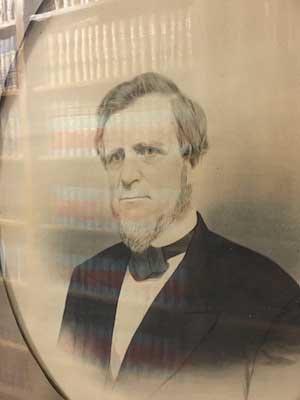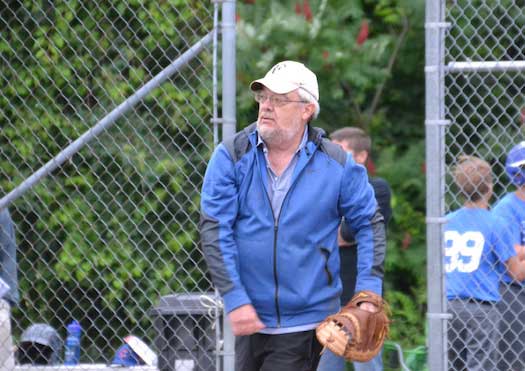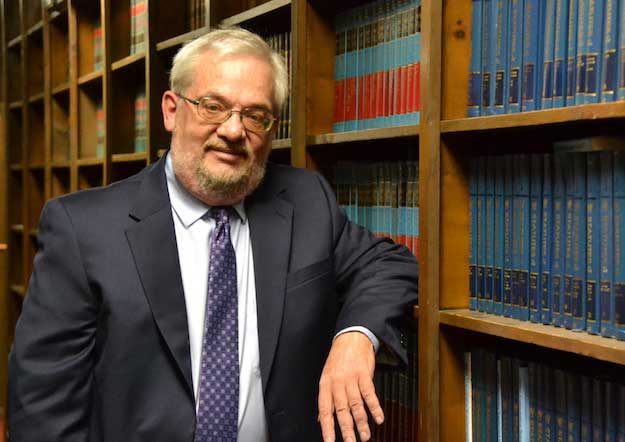Sanford Church says he is ready to serve community as next county judge
‘I’ve learned to keep an open mind, listen to everything, and then figure it out and figure out what the just response is.’
ALBION – Sanford A. Church, 59, is the Republican candidate in the Nov. 7 election for Orleans County judge.
Church grew up in Albion and played on the Albion football and basketball teams, and was one of the top tennis players on Albion’s undefeated tennis teams. He earned a law degree at Duke University, where he met his wife, Diane, who is also an attorney.
They have two grown children. Ben, 26, is a graduate of the Northwestern Medical School in internal medicine, and is doing his residency in California. Molly, 24, earned a bachelor’s degree in psychology at the University of Pittsburgh and is studying to be a mental health counselor in Boston at Tufts University.
Church returned to Albion after getting a law degree, and worked with his late father, Ted Church, at an office on East Bank Street.

This picture of Sanford E. Church hangs in the law offices of Church and Church in Albion.
The Church family goes back generations in Albion, including Sanford E. Church, the first lawyer in the family who was an elected district attorney and went on to serve as lieutenant governor, state comptroller, and the chief judge of the NYS Court of Appeals. A historical marker stands by his former home on Ingersoll Street, which is now the Merrill-Grinnell Funeral Home.
Sanford A. Church seeks to succeed the retiring James Punch as county judge. Church has the backing of Punch and most of the attorneys in the county for the elected position. Church faces Tonia Ettinger on Nov. 7.
Church has been a long-time Little League coach for the Rotary-Lions team, and has been involved with the Rotary and Lions clubs, as well as serving on the Albion Board of Education.
He has been the public defender for about 20 years, representing low-income people facing felony charges. Church, a former member of the Albion Board of Education, has practiced law in all of the courts a county judge will preside.
Church was interviewed at his Albion office last week by Tom Rivers, the Orleans Hub editor.
Question: After graduating from Duke, why did you come back to Albion?
Answer: When were at Duke we were around a lot of lawyers who wanted to be at big firms. I watched it and didn’t want to do that, and decided to come back to my family practice where we’ve been lawyers forever.
Question: You were mid-20s then?
Answer: It would have been ’84, so roughly 26.
Question: How did you get involved as an assistant DA?
Answer: The way it worked first is I came back and started practicing with my dad. Curtis Lyman was the DA at the time. He asked if I would be one of his assistant district attorneys. I did that in ’85 for just a few months because then – this is a long story – there are attorneys who work for judges and the one who was working for (former) Judge Miles got a job as a support judge. So then Judge Miles, who had seen me do things in court, asked me to be his law clerk, which is the lawyer that works for the judge and does research, and writes decisions. I did that until ’89 and then I worked part-time in the same type of job for the Family Court judge in Batavia, and kept the practice here. And then I did assistant DA and assistant public defender, depending on what was going on and who wanted me to do what. Then I moved to public defender.
Question: I think you’ve been the public defender for as long as I’ve been here. (Tom Rivers started working as a reporter in Orleans County in July 1996.)
Answer: It’s got to be over 20 years.
Question: Why have you stayed in that job so long? What do you like about it?
Answer: The public defender’s job is part time. It allows me to do other things and still be a lawyer. I like coaching, too. It enables me to do all the different types of courts that I do. It is helping to represent people.

Sanford Church speaks during last Thursday’s Orleans County Republican Rally.
Question: What do you do as public defender? Aren’t you the administrator of the office as well as an attorney handling cases?
Answer: The way it is set up there is the public defender’s office and I am the boss so to speak of the public’s defender’s office. There are three assistant public defender attorneys who work under me or for me, however you want to say it. And so then with the criminal cases if we have a conflict of interest with the case we have to get an attorney who is not affiliated with the public defender’s office, in other words, not me or the three other attorneys. Right now the system is set up so Jeff Martin (an attorney in Holley) assigns the assigned counsel, who are private practitioners who take cases.
Question: Who are the three assistants?
Answer: Nathan Pace, Dominic Saraceno and Patricia Pope. She doesn’t do county court. She does the other courts.
The only courts the public defender’s office does in Orleans County is criminal. But I do Family Court, Surrogate’s and others as well.
Question: What is the Surrogate’s Court?
Answer: It takes care of peoples’ estates who have passed.
Question: What would the judge do?
Answer: In the beginning, it can be if a will is valid. Someone in the family may think there was undue influence on somebody signing the will, something like that. There are legal formalities that have to be filed and a surrogate can end up ruling whether the will is to be accepted or not. Sometimes it’s a battle. After it is accepted the executor has to then collect everything and dole it out so it is consistent with the will. If there is a disagreement within the family or whoever about how that should be done, then the judge has to figure that out, too.
Question: It seems there is a persona for a judge, in terms of having control of the court room. That doesn’t show up in credentials or the resume.
Answer: I can just say it’s not a plug-in position. I’ve been around law and lawyers all my life. It’s not a plug-in, anybody-can-do-it correctly for the community position. It takes the experience, knowledge and respect to do what needs to be done. You can’t just step in there and know criminal law, for example.
Question: Isn’t the judge also an administrator of the court?
Answer: Yes, with an amount of staff. I administer the PD’s office and I have some staff, too.
Question: And you have to keep the cases moving. Aren’t there time frames for the judge to keep cases moving?
Answer: For everything but Supreme Court there are what they call “standards and goals” for the courts. At least in Family and Criminal Court they try to have the cases done in six months. Now with jury trials in the criminal cases that can be hard to do, but that is what they strive to do.
Question: The public defender is a different path to getting to judge. It seems like in the smaller counties it is often the district attorney who makes the leap to judge. You have a little bit of a different resume than Judge Punch, who was DA before being judge.
Answer: I agree that it is different. The Family Court work, as an attorney for a child, I do all of that, too.
Criminal law is a lot of what is done in Orleans County, whether you are the public defender or the DA you get immersed in particular cases. The challenge is, and I’ve felt I have the ability to do it pretty well, is you figure out what the issues are in the cases, then you research it and figure out how to apply it to the case. Whether it’s the DA’s side or the public defender’s side or the defense side, it really helps to develop the knowledge base, so when you’re the judge you don’t have to start from scratch with making different decisions.
Question: Whether you’re the DA or public defender you’re playing by the same rules?
Answer: It’s the same body of law. I’m appointed, and the DA is elected. In general I’ve never run for one of these offices before. The DAs have and the public is a little more aware of them than a public defender or defense attorney.
Question: How long is the appointment for public defender?
Answer: It’s for two years. We go with the Legislature. They will meet in January and organize for two years.
I think I work well with the Legislature. I’ve been appointed a bunch of times. I work on the budget and keep that in line.
Question: People probably want to know why you want to run for judge?
Answer: I’ve been around it a long time and the judge matters. It’s an important spot. The local attorneys certainly support me. They respect me and know I can do it. I’m willing to do it and do what the county deserves. I’m used to the county and the law.

Sandy Church warms up a pitcher for the Rotary-Lions team during a game in July versus Carlton. Church has been a Little League coach for about 15 years.
Question: Why have you continued in the Albion Little League, long after your son aged out?
Answer: Number one, baseball was the thing when I was growing up. I like baseball. When I was a kid I had all of the baseball cards. I like working with the kids and getting to know some of them. Even when I was a basketball coach, you want to help the kids.
I’ve been able to back off as the head coach in Little League, but I still like working with the kids.
Question: Why have you and Diane stayed here in Albion?
Answer: I prefer the rural community. I don’t know everybody, but I know lots of people. I just like it better than the cities.
My two kids did fine coming from here. You can get involved in a whole bunch of extracurricular activities and you get the schooling. You can get there from here if a kid wants to do that.
Question: What else do you want to say?
Answer: One of the things that makes me qualified as anybody – if not more qualified than anybody around here – is that I learned how to suspend judgement after working for all of the judges over the years. I’ve learned to keep an open mind, listen to everything, and then figure it out and figure out what the just response is. I think I’ve been able to do that. The people that know the area and know me, who aren’t making snap judgements on me from one experience, they respect my ability to do that.







































































